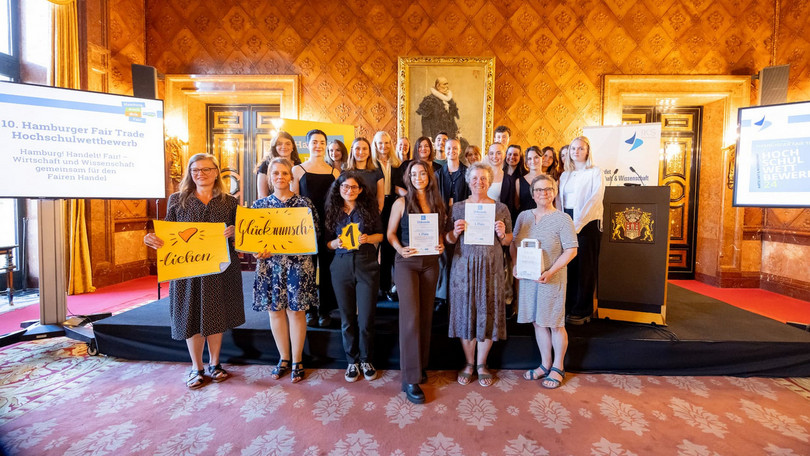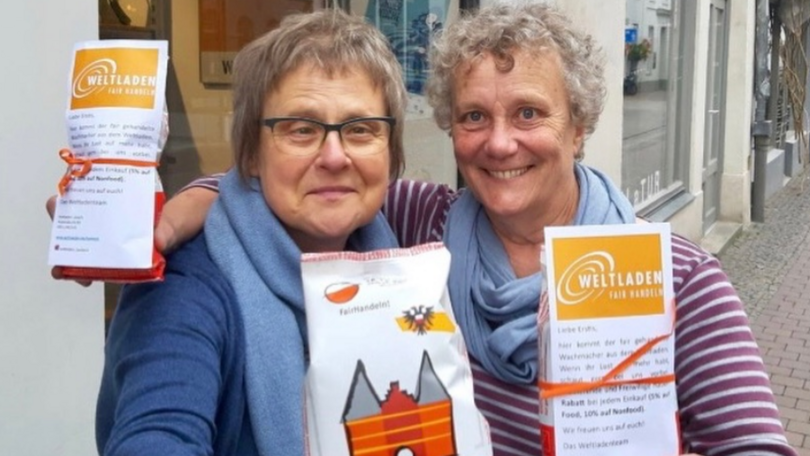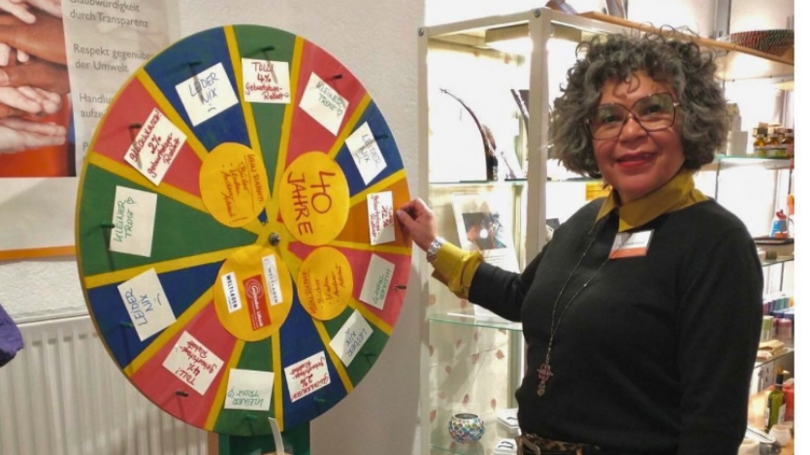Leuphana marketing team supports world shop in Lübeck
2025-02-20 The Huexstraßenfest, a team of students from the Faculty of Management and Technology and the Weltladen Luebeck are the focus of our story. It proves how quickly science can change practice or have an impact. Thanks to the marketing team of Prof. Dr. Kerstin Brockelmann, a traditional shop is now attracting new target groups. It also comes with a win for Leuphana: the young people took first place in the Hamburg Fairtrade Town competition. The team consisted of marketing and business psychology students from the School of Management and Technology.
Spinning the wheel
A few weeks after the end of the project, the Leuphana team received some good news from Luebeck. The celebration in the renown Huexstraße had brought the first successes for new marketing ideas: ‘In the evening, we had record sales. So, it was a success all round! I think it's all thanks to you,’ writes Bettina Sick-Folchert, one of the shop's two full-time employees. The store is run by the Weltladen Luebeck association. A total of 35 volunteers work there to spread the idea of fair trade around the world.
According to their analysis and the creation of profiles of potential customers, the Leuphana students found that the expansion of the Instagram channel, in particular, could help to achieve this. But the marketing team also had the task of efficiently addressing the target group.
Inspired by the team's new ideas, the employees set up a wheel of fortune at the aforementioned festival, offering various discounts. Depending on the colour on which the wheel stopped, there were different thematic questions (about the shop, about fair trade). Those who answered correctly then received a percentage off a purchase in the shop.
‘We were stunned by the effect ourselves: a lot of people wanted to spin the wheel of fortune. We already knew that, but when they won the discount, they didn't just walk on, as usually happens. They looked around the shop and bought something, even if it was just a chocolate. However, many said that they would definitely have to come back when they needed a present,’ Bettina Sick-Folchert continues.
Business and science for fair trade
The impact of the project work of around 20 students from the ‘Consumer Psychology and Relationship Management’ seminar in the Minor Business Psychology is still being felt. They set out to support the Luebeck World Shop, which has been in existence for 40 years. Seventeen years ago, it moved to Huexstraße, one of the city's most popular shopping streets.
The Lueneburg team took on the Weltladen task as part of the 10th Hamburg Fair Trade University Competition. In April 2024, the team presented themselves to a jury in Hamburg under the motto ‘Hamburg! Trade! Fair!’ and won.
The goal: to reach new target groups with a suitable marketing strategy. ‘This seemed like an opportunity for us. Although we were concerned that working with the students would cost us a lot of time, we wanted to advance our social media strategy,’ says Bettina Sick-Folchert. ‘The collaboration was very refreshing for us. The students approached us with a lot of interest and appreciation.’
Know your customers
‘The collaboration with the Weltladen Luebeck offered an excellent opportunity to put theoretical knowledge into practice while making an important social contribution,’ says Prof. Kerstin Brockelmann, who supervised the students in the project.
Practice and personal development
The head of the Institute for Marketing at the Faculty of Management and Technology brings a wealth of experience in the strategy and implementation of marketing concepts, having worked in management consultancy for many years. The business psychology programme at Leuphana University, with its focus on market and consumer psychology, is an excellent basis for those who want to enter the profession later, explains the professor, emphasising not only the link between theory and practice but also the personal added value of the Luebeck project for her students: ‘This practical experience is of great value both for academic, application-oriented training and for personal development.’
Student Lea Hanusch particularly remembers the street survey: ‘With this survey, we collected data to define the target group and find out how well known the shop already is in Luebeck.’
It was exhausting, but it had the side effect of simultaneously drawing people's attention to the shop. ‘We motivated each other to approach the people passing by. It's not easy to deal with rejections, so we kept encouraging each other,’ she continues.
Interdisciplinary and well organised
Fellow student Hanna Grieb also confirms the interesting team experience: ‘What was most surprising for me was that we were able to set up such a large project in such a short time.’
The project group included fourth- and eighth-semester students from very different fields of study, such as International Business Administration and Entrepreneurship, Psychology, Digital Media and Global and Environmental Sciences.
‘It was precisely because we came from different academic disciplines that our teamwork was constructive. Each member brought their own strengths to the table,’ Hanna continues.
Nevertheless, there were challenges, as her team colleague Lea Hanusch explains: ’At times during the process, I felt that we were losing sight of each other and drifting in different directions. A kind of hierarchical organisation proved useful here.’
This made it easier for the two large subgroups, ‘Social Media’ and ‘Customers’, to carry out their internal work. The students then split into further sub-areas, such as ‘Analysis’, ‘Customer Acquisition’ and ‘Customer Loyalty’. There were people responsible for each of these areas who passed on the intermediate results and kept an eye on the time frame. ‘We went through the theory with Prof. Dr. Brockelmann before the project started, but we had to apply it ourselves,’ she adds.
Lightness instead of a moralistic approach
After the detailed analysis, the students created the desired marketing strategy with the help of customer profiles they had developed. It was designed to help the world shop expand its reach and thus its influence in fair trade. For example, the team recommended price reductions for students and also new ways of communicating, for example with the university and chamber of commerce, or stronger networking in Luebeck via social media.
‘I was also surprised to learn that we should be offering more ‘pleasurable’ activities, such as candle-painting workshops instead of information evenings; cocktail evenings; Easter egg hunts at the world shop. We had already moved away from the early strategy of the world shop movement of using the moral high ground to persuade people to buy, but the people of Lueneburg took us a step further in that direction. More light-heartedness, I would say,’ says Ute Lankowski, who is responsible for purchasing and merchandise management in the shop.
A workplace created
The strategy is also being supported by a newsletter. To manage all of this, a mini-job position for social media has been set up. This person now ensures that interesting information from the shop is shared regularly. In the coming year, the new events will then be firmly scheduled. ‘We have also contacted the music academy and donated coffee for first-year student bags, referring to the student discount.’
So, thanks to the Leuphana students, a whole range of good ideas have been implemented in Lübeck, and Lea Hanusch says: ‘I was surprised that we, as a large group, were able to create a handout that reads fluently, makes sense and adds value. The fact that we won first place in the Fairtrade Town competition makes me proud.’
Great practical experience instead of dry theory
Her fellow student Aimee Andorf adds: ‘It was great how cooperative and open the Luebeck World Shop was. When we visited the shop for the customer survey, we were greeted with coffee and snacks.’
During the award ceremony in Hamburg, all participants summarised that such communication and cooperation was not possible with all partners. ‘Overall, the competition was a great learning experience that gave me personally more than a regular lecture, which is limited only to theory,’ concludes Aimee.
And would the Luebeck team enter into such a partnership again?
‘At a time when many small world shops are having to close because they are no longer economically viable, it is important that science also provides impetus on how to advance fair trade. We would certainly be available for such ‘missions’.’



